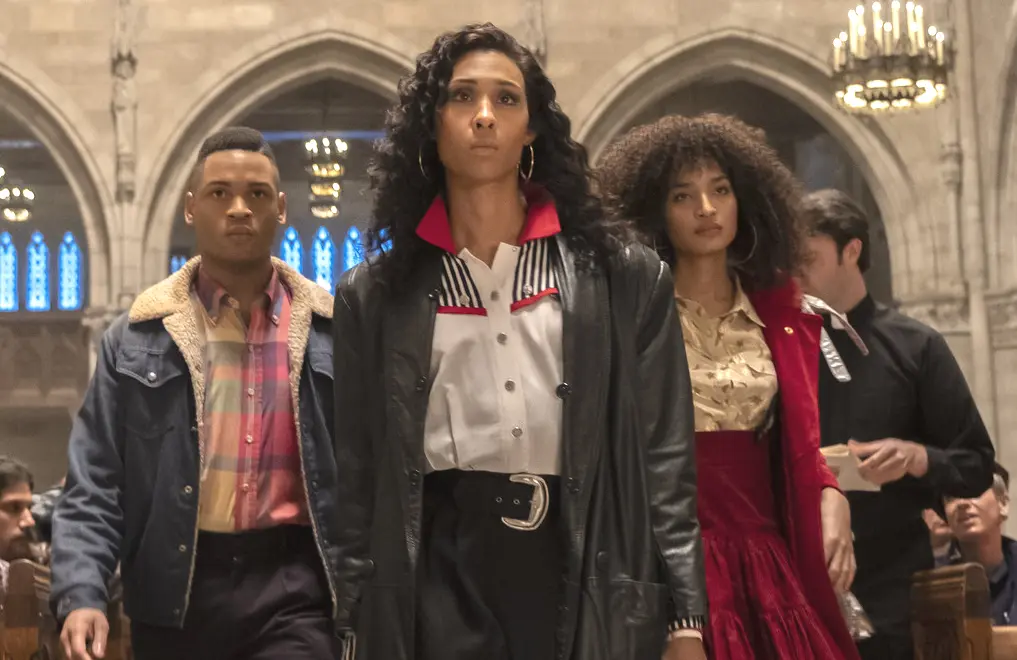Pose Season 2 Tackles the Tradeoffs of Mainstream Visibility
-
 Ryan Jamaal Swain, Mj Rodriguez and Indya Moore in the Season 2 premiere of Pose (Macall Polay/FX)
Ryan Jamaal Swain, Mj Rodriguez and Indya Moore in the Season 2 premiere of Pose (Macall Polay/FX)I can personally vouch for the accuracy of one of the period details in Pose’s second season premiere. The episode is set in the spring of 1990, when Madonna’s song "Vogue" was released, and -- according to the show -- the entire world was talking about it.
Even if you weren’t in the drag houses of New York City -- even if, like me at the time, you were an eleven year-old boy in Tennessee -- both the song and the video were indeed everywhere. I remember teachers at my elementary school parsing the references to Rita Hayworth and Katharine Hepburn. I remember my neighbor Lisa voguing in her front yard while her little sister ran through the sprinkler. I suspect Barbara Bush almost created a coffee table book about her dog Millie called Strike a Paws. (She opted for this instead, which is still pretty fabulous.)
For me, "Vogue" prompted an awakening. It not only ignited my lifelong Madonna fandom, but also got me in touch with my nascent gayness. As I stayed in from sixth-grade recess to practice the video’s choreography, or as I taught a voguing seminar to my summer theater camp, I internalized the song’s don’t-fuck-with-my-fantasy confidence. I learned that being gay could mean being witty, stylish, and fearlessly expressive.
Granted, I didn’t really know who Dietrich and DiMaggio were; I didn’t comprehend the disco references bubbling all over the backing track; and I certainly didn’t have a concept of the social importance of New York's house balls. But on some level, I recognized "Vogue" as the beacon of belonging that it was.
Madonna and her megahit weren’t only carving out space for young gay boys, though. They were also pushing the drag ball culture onto a global stage. In its second-season premiere, titled "Acting Up," Pose contends with that sudden exposure. It wants us to consider what "Vogue" meant for the voguers.
The episode -- written by series co-creators Ryan Murphy, Brad Falchuk, and Steven Canals -- knows it’s a tricky subject. On one hand, Blanca (Mj Rodriguez) is thrilled. She believes this attention will legitimize the ball scene and give her kids a chance to earn both a living and some respect. Others, though, are dubious. Pray Tell (Billy Porter) notes that the disco era ended with straight people burning their Donna Summer records in a baseball stadium, and he assumes that when the mainstream gets tired of posing, they’ll once again kick the queens to the curb.
They’re both right, in a way. There’s no denying that Madonna and many other artists of the early 90s used the sounds and styles of the queer underground to make their art, and often, the profits and opportunities didn’t flow back to those communities. But sometimes, just a little bit, they did. Two of the dancers from the "Vogue" video -- who also traveled the world with Madonna on the Blond Ambition Tour -- were from the house of Xtravaganza. One of those dancers, Jose Xtravaganza, is a cast member on Pose. He’s in this very episode as one of the ball judges, and you can see him in the center of the climactic voguing scene. (Sandra Bernhard, another famous friend-of-Madonna from this period, is also a cast member.) So for the characters in this show and their community at large, Madonna’s attention is perhaps a "complicated positive."
This is all part of the episode’s larger theme about the tradeoffs of being seen by the mainstream. We see Angel reach the top ten of a modeling competition, which means potential career advancement but also a humiliating session with a fashion photographer. Then there’s the attention the characters receive when they join an ACT UP protest in a Catholic church: They make a vital point about the Church’s shameful treatment of people with AIDS, but they also get arrested. No silver lining comes without a dark cloud.
In every case, the show is asking us to evaluate the value of public scrutiny. Is it okay to have your culture appropriated without your permission if it opens a few doors? Is it preferable to be seen when you’re demanding that people look at you? Can any of this keep queer people out of the potter’s field we see at the beginning of the episode, where the anonymous dead are left to be forgotten?
The rest of the season will likely wrestle with these questions while "Vogue" throbs on the soundtrack. Meanwhile, I’ll be thinking about my own role in this conversation, as someone who first heard his gay heartbeat in Madonna’s culture-appropriating, absolutely legendary song.
People are talking about Pose in our forums. Join the conversation.
Want more pop music talk from Mark Blankenship? Join him at Mark and Sarah Talk About Songs.
Mark Blankenship has been writing about arts and culture for twenty years, with bylines in The New York Times, Variety, Vulture, Fortune, and many others. You can hear him on the pop music podcast Mark and Sarah Talk About Songs.
TOPICS: Pose, FX, Madonna, Michaela Jaé Rodriguez, Ryan Murphy